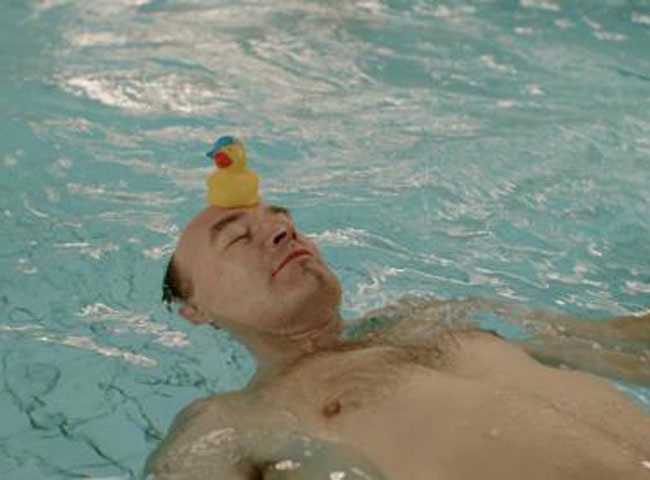Die Menschenliebe
-
Réalisé par Maximilian Haslberger • Écrit par Maximilian Haslberger
-
Allemagne • 2014 • 99 minutes • Couleur
- Réalisation :
Maximilian Haslberger - Écriture :
Maximilian Haslberger - Image :
Sebastian Mez - Son :
Backhaus Backhaus, Jochen Jezussek - Montage :
Katharina Fiedler
- Production (structure) :
Amerikafilm GmbH - Ayant droit :
Amerikafilm GmbH
- N° ISAN :
non renseigné
Résumé
Jochen est banni de la maison close, Sven paie les hommes et les femmes, les deux sont en attente de l'amour. Sexualité au-delà des limites de termes tels que la santé, les handicapés, le documentaire ou la fiction.
"It happens in the background, quite casually: a woman in a wheelchair, a minor character, smiles and waves. Suddenly her wheelchair takes off and leaves the earth with her. Anyone who notices this must wonder what is still documentary content here. In fact, this film sends out a number of signals that it doesn’t want to draw a categorical line between documentary and fiction. Its deliberate haziness, which continually tests the audience’s perception, corresponds with its refusal to accept the categories of “healthy” and “handicapped”. After all, everybody wants to live sexuality and love equally – and this brings us to the subject.
There is Joachim on the one hand, who lives alone, seems completely healthy and yet lives in a grey area between relative independence and patronisation, especially by his sister who dismisses his infatuation with a prostitute as an anomaly. The subjective camera forces us to take Joachim’s perspective, the uncomfortable perspective of a stalker.
Sven on the other hand, the protagonist of the second chapter, is physically deformed and wheelchair bound but has a remarkably strong awareness of his needs, which he articulates frankly and satisfies with the help of male and female prostitutes. His longing for love, however, is not fulfilled. What would it take for that to happen?
A film that keeps raising questions that only the viewer can answer."
(Lars Meyer)
Es passiert ganz beiläufig im Hintergrund: eine Frau im Rollstuhl, eine Nebenfigur, lächelt und winkt. Plötzlich hebt ihr Rollstuhl ab und verlässt mit ihr die Erde. Wer es bemerkt, muss sich fragen, was hier noch dokumentarisch ist. In der Tat setzt der Film viele Zeichen, dass er zwischen Dokumentar- und Spielfilm nicht kategorisch unterscheiden will. Seine bewusste Unschärfe, die die Wahrnehmung des Zuschauers kontinuierlich auf die Probe stellt, korrespondiert auf der inhaltlichen Ebene mit seiner Verweigerung der Kategorien „gesund“ und „behindert“. Sexualität und Liebe, und damit sind wir beim Thema, wollen schließlich von allen Menschen gleich gelebt werden.
Da ist zum einen Joachim, der alleine wohnt, vollkommen gesund wirkt und doch in einer Grauzone lebt: zwischen relativer Selbstständigkeit und Bevormundung, insbesondere durch seine Schwester, die seine Verliebtheit in eine Prostituierte als Anomalie abtut. Die subjektive Kamera zwingt uns in Joachims Perspektive, in die unbequeme Perspektive eines Stalkers.
Sven dagegen, Protagonist des zweiten Kapitels, ist körperlich deformiert und sitzt im Rollstuhl, hat dafür aber ein außergewöhnlich stark ausgeprägtes Bewusstsein für seine Bedürfnisse, die er offen formuliert und durch männliche und weibliche Prostituierte abdeckt. Die Sehnsucht nach Liebe erfüllt sich für ihn aber nicht. Was müsste dafür geschehen?
Permanent wirft der Film Fragen auf, die nur der Zuschauer selbst beantworten kann.
À propos du film
Sélections et distinctions
- 2014 • Visions du Réel • Nyon (Suisse) • Sélection Etat d'Esprit
- 2014 • DOK Leipzig - International Leipzig Festival for Documentary and Animated Film • Leipzig (Allemagne) • Mention d'Honneur
Comment avoir accès au film ?
-
Édition DVD
- Il n'existe pas d'édition DVD à notre connaissance
-
Accès VOD
- Il n'existe pas d'accès en VOD à notre connaissance
- Distribution
- Aide sur les moyens d'accéder à un film
